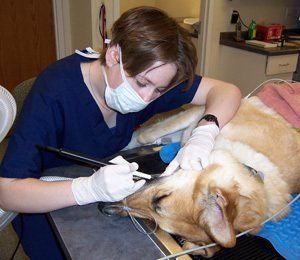Professional Dental Care at Weston Veterinary Hospital
For most of us, caring for our teeth and gums has been part of our daily routine for as long as we can remember. Imagine what would happen if you didn’t care for your teeth regularly. The same basics of dental care also apply to your pets’ teeth.
Periodontal disease starts with plaque accumulation on the teeth and inflammation of the gums. If left untreated, it damages the tissue and bone that keep the teeth anchored in place. Infection, bleeding gums, bad breath, pain, and tooth loss follow.

End bad breath and inflamed gums.
Pets have teeth too!
Teeth Cleanings are just as important for our dogs and cats as they are for us. Oftentimes, they are much more important, as many dogs – and most cats – dislike teeth brushing. Many small-breed dogs will benefit from a teeth cleaning every single year!
Professional dental cleaning and treatment is one of the cornerstones of preventative dental health care for our pets. All dogs and cats benefit from dental cleaning and some an annual dental cleaning and oral examination under anesthesia and, on average, this should start at age 3.
- PREANESTHETIC LABORATORY TESTING is done to ensure that the organs involved in the metabolism of anesthetic agents, particularly the kidneys and the liver, are healthy and able to eliminate them rapidly from the body.
- ANESTHESIA is necessary because our patients must be still so we can perform a thorough dental cleaning. We use the safest anesthetics available and we monitor your pet’s heart rate, rhythm, respiration, temperature, blood pressure, cardiovascular function, and comfort.
- SCALING is performed both with an ultrasonic scaler and hand instruments. Scaling removes plaque and calculus above and below the gum line.
- POLISHING the teeth is done after scaling to smooth out any tiny grooves or nicks in the tooth’s enamel surface.
- FLUORIDE is applied after polishing to strengthen the tooth enamel and decrease the rate of plaque reattachment.
- EXAMINATION of your pet’s teeth and gums is performed by probing each tooth and its surrounding tissues for cavities, fractures, infection, and bone damage.
- ANTIBIOTICS may be needed if periodontal disease has already begun. An injection is routinely given before anesthesia to minimize oral bacteria and oral medication may be dispensed depending on your pet’s condition.
Home Dental Care
Brushing your pet’s teeth is the best thing you can do at home to promote good oral hygiene. Just think how your teeth would look and how your breath would smell if you never brushed your teeth! Brushing breaks down the daily deposit of plaque and bacteria before they harden into tartar.
Begin with your finger, or wrap a gauze square or washcloth around your finger, and use it like a toothbrush. Rub your finger over the outside of the teeth and gums. Afterward, give your dog a treat as a reward. Do this once or twice a day for a few weeks so the dog gets used to having his teeth and gums rubbed.
You’re now ready for a soft toothbrush – ones made for small children are perfect. If your pet puts up a fuss, try adding a little flavored dog or cat toothpaste or try dipping the toothbrush in warm water and garlic salt (for dogs) or tuna water (for cats). Don't use human toothpaste, because it will irritate your pet’s stomach and cause foaming at the mouth or vomiting.
Brush the teeth by holding the bristles at a 45-degree angle to the tooth’s surface and moving the brush in an oval direction, being sure to get the crevice where the gums meet the tooth. Brush your pet’s teeth at night after all meals are finished for the day, and brush them at least once every 2-3 days.
If brushing your pet’s teeth is difficult, we carry a special oral hygiene dental rinse that can be applied between your pet’s cheek and gum. It helps to kill bacteria and prevent plaque buildup. This should still be done just as often as brushing to do the most good.
If you can’t brush or apply the oral rinse, there are chews! Most have a mild abrasive action to help wipe away the thin layer of buildup on teeth. Some are treated with enzymes to help fight plaque and reduce bacteria. All of these should be fed daily for best results. We carry CET chews for dogs, Greenies for cats, and a special dental diet called t/d.
Stay away from cow hooves, nylon bones, deer antlers, and real bones! They are too hard and can frequently break teeth!